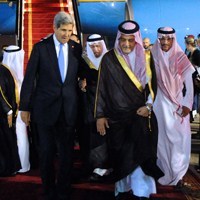The Middle East has played such a pivotal role in U.S. national security over the past few decades that it’s easy to forget this is a recent phenomenon. It wasn’t until the mid-1970s that America’s growing dependence on Middle Eastern oil, concern about expanding Soviet military power and an intensification of the U.S. relationship with Israel elevated the region to the first tier of American security concerns. With the end of the Cold War, the Middle East became paramount in America’s global strategy. Now, in a shift of potentially historic impact, that may be coming to an end. The coming years will certainly bring a lower U.S. profile in the Middle East and may see something approaching disengagement.
The reasons for this shift are not hard to understand. To a large degree they reflect a deep weariness in the United States with the burdens and costs of managing regional security systems. Americans are frustrated that years of involvement in places like Afghanistan, Iraq and Egypt did little to make the United States more secure and generated little gratitude. The United States remains highly unpopular in precisely the places where it has invested the most money, effort and lives. This frustration is shifting U.S. strategy from trying to alter the conditions that give rise to conflict and extremism to containing or defeating extant threats.
A growing gap in threat perception between America and its key Middle Eastern allies, particularly Saudi Arabia and Israel on the question of Iran, is also creating pressure for disengagement. Most Americans believe Iran can be contained and deterred, while the current leaders of Saudi Arabia and Israel do not. The U.S. relationship with Saudi Arabia and other Arab nations was never based on common values and priorities, but on shared threat perception and economic dependence. This type of strategic partnership is always more fragile than one steeped in commonality. As Middle Eastern petroleum declines in importance to the United States and differences in threat perception mount, the result may be relationships between the United States and Middle Eastern nations—including Israel—that are, in the words of Stephen Walt, normal but not “special.”

